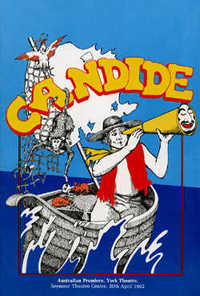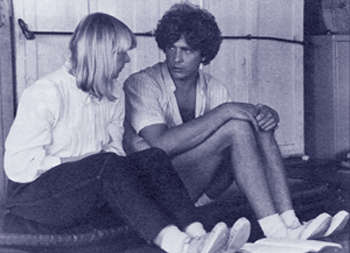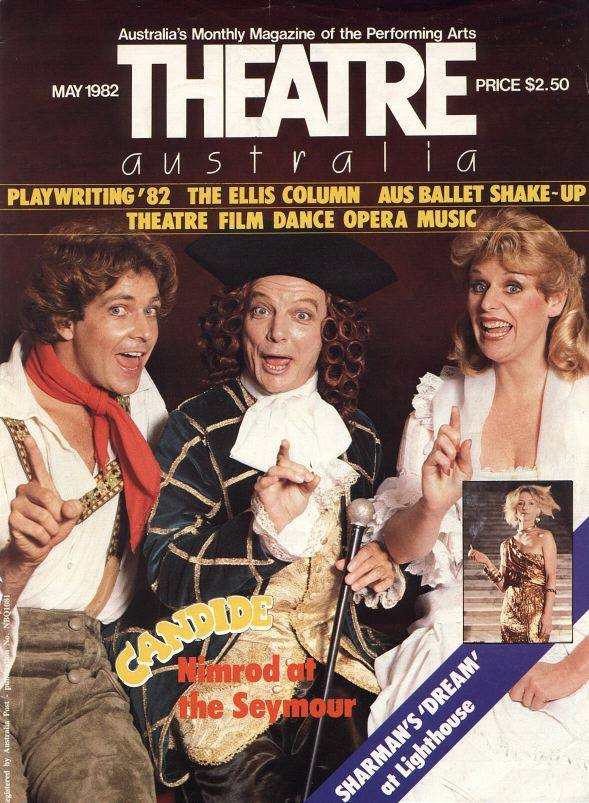CANDIDE
Sydney's Nimrod Theatre Company, York Theatre 1982 Australia

- Music by Leonard Bernstein
- Lyrics by Richard Wilbur
- Additional Lyrics by Stephen Sondheim and John LaTouche
- Book adapted by Hugh Wheeler from Voltaire's novel
- Director, John Bell
- Director of Music, Robert Gavin
- Designer, Roger Kirk
Synopsis
In a Baron's castle in Westphalia lived, in extreme happiness, four young people: Cunegonde, the Baron's beautiful daughter; Maximilian, his equally beautiful son; Paquette, a very obliging serving girl; and Candide, an obscure bastard cousin. They had the great fortune to be instructed by that legendary philosopher Dr. Pangloss, who taught them that this is the best of all possible worlds and that everything that happens in it is for the best. There is, however, one slight flaw in this idyll: The humble Candide and the exalted Cunegonde fall very unsuitably in love. Their love discovered, Candide is summarily thrown out of the castle. Forced to fend for himself, Candide, on the eve of war with the neighboring Bulgarians, is tricked into enlisting in the enemy army, and endures many other mishaps on the way to reunited with his love. Cunegonde too has her problems, after she is abducted during Mass by a sergeant in the envading Bulgarian army. These ordeals sorely try but do not destroy both Candide's and Cunegonde's faith in Dr. Pangloss's philosophy, and through all of them Candide's and Cunegonde's, love each other remains totally untouched and eternally.

Cast
- Candide - Philip Quast
- Voltaire, The Narrator - Jon Ewing
- Cunegonde - Susan Van Cott
- Maximiliian - John Hannan
- Paqtiette - Christine Mahoney
- Doctor Pangioss - Jon Ewing
- The Baron Thunder-Ten-Tronck - Barry Lovett
- The Baroness - Deidre Rubenstein
- Bulgarian Army Recruiters - Rick Burchall, Tony Taylor
- Don Issachar - Tony Taylor
- Grand Inquisitor - Rick Burchall
- Agent of the Inquisition - Tony Sheldon
- The Old Lady - Deidre Rubenstein
- Spanish Dons - , Tony Taylor, Michael Smith
- Waiter - Barry Lovett
- Governor of Cartagena - Jon Ewing
- Governor’s Aide - Tony Taylor
- The Sheep - Jacqui Hall, Karyn O'Neill
- The Lion - Tony Sheldon
- Sultan of Constantinople - Jon Ewing
- Monks, Nunns, Soldiers, Citizens of Cartagena, Pirates, Slaves & Odalisques play by the Company
Musical Numbers
Overture
Act One
- Fanfare (instrumental) / Life Is Happiness Indeed + - Candide, Cunegonde, Maximilian, Paquette
- The Best Of All Possible Worlds - Dr. Pangloss, Candide, Cunegonde, Maximilian, Paquette
- Happy Instrumental / Oh, Happy We - Candide, Cunegonde
- Candide Begins His Travels (instrumental)
- It Must Be So (Candide's Meditation) - Candide
- Westphalian Fanfare, Chorale, Battle Music, and It Must Be So (instrumental reprise)
- Entrance of the Jew (instrumental)
- Glitter and Be Gay - Cunegonde
- Earthquake Music (instrumental) / Dear Boy - Dr. Pangloss
- Auto-Da-Fe (What A Day) - Chorus, Inquisitors, Judges
- Candide's Lament - Candide
- You Were Dead, You Know - Candide, Cunegonde
- Travel (To the Stables) (instrumental) / I Am Easily Assimilated - Old Lad
- Quartet Finale - Candide, Cunegonde, Old Lady, Businessman
Act Two
- Act Two Entr'acte - Orchestra
- Ballad of the New World (new lyrics by Richard Wilbur to Ballad of Eldorado) -
- Candide My Love - Governor, Maximilian
- Barcarolle (instrumental)
- Alleluia - Chorus
- Eldorado
- Sheep Song + - Sheep, Lion, Paquette, Candide
- Governor's Waltz
- Bon Voyage - Governor, Chorus
- Quiet- Old Lady, Paquette, Candide Constantinople (instrumental) / What's the Use? - Prefect, First Gambler, Second Gambler (Police Chief)
- Finale: Make Our Garden Grow- Candide, Cunegonde, Entire Company

Reviewed by Colin Menzies
The Sun-Herald Sydney Australia 25 April 1982
Last year the Sydney Theatre company had THE smash hit musical, with a record-breaking run of Chicago. This year Nimrod undoubtedly will take the title with a superb production of Candide.
Candide has everything a big musical demands: lots of colour, movement and vigorous singing.. by principals who sing as skilfully as they act.
The show is based on a book 'rattled off' by Voltaire in 1759. Leonard Bernstein took the tale of a young man gathering experience as he travels the world, and turned it into a musical extravaganza. Of course much of Voltaire's philosophical inquiry into good and evil has been, rightly, supplanted. But enough of the original theme of satirising optimism and Elysian foolishness has been retained to help the show roll along on laughter.
Candide (Philip Quast) is the hero, the bastard son of a Westphalian
aristocrat. He is taught, with the other sheltered offspring of their mythical
nation, that theirs is 'the best of all possible worlds.' Their naivety,
however, is quickly dispelled. And the show expends its enthusiasm
on the misfortunes that separate Candide and his mistress, Cunegonde, and
the trials by war, ravishment and torture that best the other innocent
Westphalians.
 But
you need no prior knowledge of Voltaire to enjoy Nimrod's brilliant production.
Director John Bell has crammed in a score of theatrical surprises and he
avoids the temptation to reuse them.
But
you need no prior knowledge of Voltaire to enjoy Nimrod's brilliant production.
Director John Bell has crammed in a score of theatrical surprises and he
avoids the temptation to reuse them.
Bell and designer Roger Kirk have made full use of the Seymour Centre's
York Theatre. The production bubbles forth on a boardwalk surrounding
a central musicians' pit, and on various levels upstage. Only briefly did
the action become caught in the limitations of this clever design.
And, another minor quibble, once or twice the music drowned the lyrics.
But overall the show is a splendid hit. Its range of styles leaves
a feeling of satiation. If you see only one musical in the next decade,
make sure it's Candide. Congratulations to all involved.
Candide: Bold, brassy
By John Moses
THE AUSTRALIAN 22 April 1982
Sydney's Nimrod Theatre has disclaimed any intention to tackle its rival, the Sydney Theatre Company, head on when it comes to creating spectacular shows.
But in the theatre, as in diplomacy, such disclaimers are often more apparent than real —as Nimrod's Australian premiere production of the Leonard Bernstein musical Candide, at the Seymour Centre, abundantly proves.
Candide
is bold, brassy, extrovert and enormous fun. It will not necessarily
please
students of history and philosophy who wish to see Voltaire's witty and
deeply ironic novel faithfully reproduced. But it will most certainly
give great pleasure to those theatregoers who believe that color, excitement
and skillful energy are necessary ingredients of the arts of the stage.
Voltaire himself, one suspects, would not have been displeased.
The production, to some extent, marks a point of departure from Nimrod's
general belief that small is beautiful. True, the cast numbers only 13,
but they have to play something like 80 separate characters. There is also
a highly competent band of 12 musicians, a conductor, and a big set—a thrust
stage encompassing the orchestra pit, backed by a splendid beamy structure
which gives the production dimensions unattainable in the somewhat cramped
space of Nimrod's home in nearby Surry Hills. It is not a "big" musical
in the way that the almost contemporaneous West Side Story is, but heaven
knows, it's big enough. And it works.
The piece has a curious history. With Lillian Hellman's book and Richard Wilbur's lyrics, it was too gamey for Broadway in 1956, with Tyrone Guthrie as director and our own Tom Brown as his assistant. With Harold Prince as director in a revised version in 1973 (with Bernstein making introducing some of his own ironic comment with the odd reference to West Side Story) it was a hit. This is the version that Nimrod is using.
It takes the basic theme of Voltaire's clear-eyed view of the world, the enduring nature of the human spirit in all kinds of travail, and turns it into a theatrical romp which achieves two of the great philosopher's intentions—simultaneously to entertain, and totally to undermine the widely held belief, expressed in the writings of such people as Leibniz, Shaftesbury and Pope, that 18th century man lived in the best of all possible worlds, and that anything terrible that happened — from being hanged to suffering the pox—could always by argument, or self-justification, be turned into support for that belief.
In the revised version of the piece (and I do not know how much it differs from the original) these themes are illustrated in some of the more familiar events and characters of the novel. There are some omissions, the servant Cacambo, a kind of Leporello to Candide's Don Giovanni, and the philosopher-priest Martin, who speaks often with Voltaire's voice, among them.
But these are not, in the event, as notable as the achievements of the piece, and particularly in this production, which owes its strength, character and continual liveliness not only to the clear and imaginative directorial authority of John Bell, but also to some brilliant contributions from his cast, the musicians in the pit and Roger Kirk's unashamedly flamboyant designing.
Jon Ewing is simply outrageous in his multi-charactered portrayal of the tutor Pangloss, the Sultan of Constantinople, and the Governor of Cartagena. His account of how he acquired the infection which robs him of his nose and fingers—the medical equivalent of what wine-makers describe as the "noble rot"? — marvelously expresses Voltaire's original argument.
But good as this is, it is as Voltaire himself that Ewing gives the performance of his life, detached from, amused by but still compassionate towards the characters he has created. This is acting of real authority.
Philip Quast and Susan V Cott, as Candide and his lover, Cunegonde, have the necessary air of engaging innocence, but in the nature of things— both Voltaire's and Bernstein's—it is Deidre Rubinstein, as the Old Lady, who gets better things to do, as the ultimate survivor, one of those unquenchable spirits for whom adversity is just another challenge to overcome. This is another brilliant performance.
Finally, there would be no show at all without the musical direction
of Robert Gavin. Altogether splendid, and recommended without reservation.
Delightful twists for poor Candide
By Nan Musgrove
SUNDAY TELEGRAPH Australia 25 April 1982
 click image on right to view full size version
click image on right to view full size version
In 1956 American composer Leonard Bernstein made Voltaire's novel Candide into a musical and presented it in New York. American audiences, used to saccharine Broadway musicals, balked at Voltaire's ribald, anti-clerical satire of 18th century society. The show was a resounding flop and went into mothballs.
But times - and people - have changed, and the audience at the Australian premiere of Candide at Sydney's Seymour Centre relished every twist and turn of the lampoon of Leibnitz — the philosopher who taught that "everything happens for the best in the best of all possible worlds".
Candide is an unworldly youth steeped in the teachings of a philosopher, Dr Pangloss, who preachers optimism and a belief in the benevolence of divine providence. But Candide finds real life to be the total opposite. Misfortune follows him and his companions, wherever they go.
Candide is Nimrod's biggest production so far and they can be justifiably proud. The staging and costumes of Roger Kirk, combined with the direction of John Bell, are remarkable.
Candide is played by Philip Quast, of the South Australian Theatre Company. His love, Cunegonde, is played by American Susan Van Cott, a blonde as pretty as a pastoral. At his professional best is John Ewing. He is equally effective as a dignified Voltaire, the lecherous Governor of Cartagena, the philosopher Pangloss and the Sultan of Constantinople.
Bernstein's music is exciting and brassy, carrying the play from climax to climax.
CANDIDE, York Theatre, Seymour Theatre Centre, Monday to Friday 8pm,
Saturdays 5pm and 8.30pm Thursdays 2pm Bookings at the Seymour Centre.
Grateful thanks to the friendly staff at Sydney's Mitchell Library for their help in locating these articles.